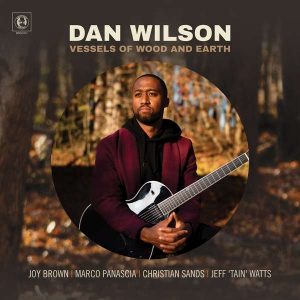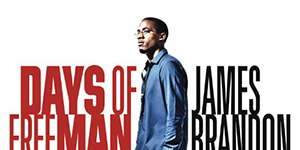Dan Wilson – Vessels Of Wood And Earth
Every few years, there is a guitarist popping up which garners more attention than your regular player. Dan Wilson, who started out as a guest on organist Joey DeFancesco‘s group, later joined Christian McBride‘s trio and has now released his debut on Christian’s Brother Mister label, called “Vessels Of Wood And Earth”. The bass man also produced this set.
On the album, repertoire is king. From highly unique individuals to Stevie Wonder, from “Cry Me A River” to Marvin Gaye and John Coltrane, here’s an artist who doesn’t shy away from a vast array of sounds and spheres. On the album opener, Dan’s own bopping “The Rhythm Section”, he is joined by his core group of musicians: Christian Sands on piano, Marco Panascia on bass, and Jeff “Tain” Watts on drums, the latter with a driving and inspiring work on the tune. Christian plays some off-kilter keys on Stevie’s “Bird Of Beauty” where he also shines with astonishingly deft moves on the acoustic.
Dan’s playing reminds me of some of the mid-60s Blue Note stuff by Grant Green, his phrasing can be very demanding, like on his own “The Reconstruction Beat”, where he excels in a duo setting towards the end with Jeff, but also reticent and soulful on the title track, which boasts with some lithe playing, edging towards a swingingly elegant expression. Once again, Christian’s work is adept and on the spot.
One of the most surprising cuts here is one of my favorite Pat Metheny/Lyle Mays tunes: on “James”, from the ECM album “Offramp”, Dan is joined by Christian McBride for a duo performance which doesn’t really sound like a duo, but more like a full band because of Dan’s fluid, articulate, and stirring playing. I’m not really convinced of Joy Brown‘s singing (joining here on three cuts) on the otherwise brilliant pairing of John Coltrane’s “After The Rain” and Marvin Gaye’s “Save The Children”. Dan sounds like a CTI-period George Benson (circa “Bad Benson”), but Joy seems to try too hard, comes across as too laborious. On another Marvin tune, the often-covered “Inner City Blues”, the dynamic is somewhat uneven and there are really far superior versions of “Cry Me A River”, but the ballad shows Dan’s capability of handling slower tempos with much aplomb and sovereignty. Joy has this typically lubricious angles in her singing, much like Esther Phillips had, but it’s getting too much for my ears.
The album’s best moments appear to be the high-quality playing of the group: Dan’s own compositions, like the roiling and romping “Juneteenth” are easily placed alongside another Wilson/McBride duet, the pretty fun-loving and cheerful, kind of honky-tonk-induced “Born To Lose”, a country song which was part of Ray Charles’ popular country LP from 1962.









